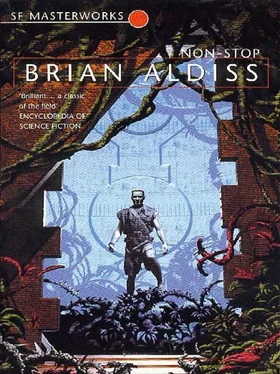‘O Consciousness, we gathered here are doubly unworthy to be thy vessels, for we know we have imperfections and do not seek to purge them as we ought to do. We are a poor lot, in a poor way of life; yet as we contain thee there is hope for us. O Consciousness, direct particularly these five of the poor vessels here, for there is more hope for us than for those we left behind, and therefore there is more room for thee in us. We know that when thou art not here there is only the adversary, Subconscious, in us; make our thoughts to swim solely in thee. Make our hands quicker, our arms stronger, our eyes sharper, and our tempers fiercer: that we may overcome and kill all who oppose us. May we smite and sunder them! May we scatter their entrails through the length of the ship! So that we come in the end to a position of power, in full possession of thee, and in thy full possession. And may thy spark breathe in us until that last dread moment when the adversary claims us, and we too take the Long Journey.’
As he had intoned, the priest had risen to his knees and stretched his hands above his head. Now he, with all the others copying the movement, drew his outstretched right index finger symbolically, ritualistically, across his throat.
‘Now shut up, the lot of you,’ he said, in his normal tone, and settled again in his corner.
Complain lay with his back to a wall and his head on his pack; he slept usually like an animal, lightly, and with no dozing stages between sleep and waking. But in these strange surroundings he lay for some while with his eyes half-shut, trying to think. He thought only in generalized pictures: Gwenny’s empty bunk; Marapper standing triumphant over Zilliac; Meller, with the jumping animal growing under his fingers; a greasy broth bubbling out Ozbert Bergass’s life; the tensed muscles on Wantage’s neck, ready to twitch his head away from prying eyes; the Guard, Twemmer, tumbling tiredly into Marapper’s arms. And behind the pictures lay the significant fact that they concerned only what had passed, and that for what was to come he could find no pictures, for he was following into unknown realms: he was moving into the other darkness his mother had spoken of and feared.
He drew no conclusions, wasted no time in worry; indeed, he felt a kind of hope, for, as a village saying had it, the devil you don’t know may conquer the one you do.
He could see, before he slept, the desolate room lit by the light percolating from the corridor and, through the outer door, a section of the everlasting tangle. In the changeless, draughtless heat, the ponics rustled ceaselessly; occasionally, a click sounded near at hand as a seed was flicked into the room. The plants grew so rapidly that, when Complain woke, the younger ones would be inches taller and the older ones wilting against the restriction of the bulkheads; then, choking and choked would alike be nipped by the next dark. But he failed to see in this ceaseless jostling a parallel with the human lives about him.
‘You snore, priest,’ Roffery said pleasantly, as they ate together at the beginning of the next wake.
The relationship between them had subtly changed, as if some occult power had been active during the sleep. The feeling that they were five rivals snatched almost casually from Quarters had vanished; they were still rivals, in the sense that all men were rivals, but now there was a mute acknowledgement of union against the forces about them. The period of watch had undoubtedly been good for Roffery’s soul, and he seemed almost submissive. Of the five of them, Wantage alone appeared to be in no way altered. His character had been eroded by constant loneliness and mortification, as the flow of water wears away a wooden post, and he no longer had anything in him amenable to change; he could only be broken or killed.
‘We must move as far as possible this wake,’ Marapper said. ‘The coming sleep-wake is a dark, as you know, and it may not be advisable to travel then, when our torches will give us away to any watchers. Before we go, however, I will condescend to tell you something of our plans; and for that it is necessary to say something about the ship.’
He looked round at them, grinning and eating extravagantly as he spoke.
‘And the first point is, that we are in a ship. All agreed there?’
His gaze forced some sort of a reply from each of them; an ‘Of course’ from Fermour; an impatient grunt from Wantage, as if he found the question irrelevant; an airy wave of the hand, meaningless, from Roffery; and from Complain ‘No’.
To the latter, Marapper immediately turned his full attention.
‘Then you’d better understand quickly, Roy,’ he said. ‘Firstly, the proofs. Listen hard — I feel strongly on this question, and a show of determined stupidity might make me regrettably angry.’
He walked round the shattered furniture as he spoke, very emphatic and solid, his face heavy with seriousness.
‘Now, Roy — the great thing is, that not being in a ship is vastly different from being in it. You know — we all know — only what being in one is like; it is that which makes us think there is only ship. But there are many places which are not ship — huge places, many of them… This I know because I have seen records left by the Giants. The ship was made by the Giants, for their own purposes which are — as yet — hidden from us.’
‘I’ve heard this argument in Quarters,’ Complain said unhappily. ‘Suppose I believe all you say, Marapper. What then? Ship or world, what’s the difference?’
‘You don’t see. Look!’ Savagely, the priest leant forward and snatched a handful of ponic leaves, waving them before Complain’s face.
‘These are natural , something grown,’ he said.
He burst into the rear room, giving the broken china bowl a resounding kick.
‘That is made , artificial,’ he said. ‘Now do you see? The ship is an artificial thing. The world is natural. We are natural beings, and our rightful home is not here. The whole ship is made by the Giants.’
‘But even if it is so –’ Complain began.
‘It is so! It is so! The proof is round you all the time — corridors, walls, rooms, all artificial — but you are so used to it, you can’t see it is proof.’
‘Never mind if he can’t see it,’ Fermour told the priest. ‘What does it matter?’
‘I can see it,’ Complain said angrily. ‘I just can’t accept it.’
‘Well, sit there and be quiet and chew it over, and meanwhile we’ll go on,’ Marapper said. ‘I have read books, and I know the truth. The Giants built the ship for a purpose; somewhere, that purpose has been lost, and the Giants themselves have died. Only the ship is left.’
He stopped pacing and leant against a wall, resting his forehead against it. When he spoke again, it was almost to himself.
‘Only the ship is left. Only the ship and, trapped in it, all the tribes of man. There was a catastrophe: something went terribly awry somewhere, and we have been left to a terrible fate. It is a judgement passed on us for some awful, unguessable sin committed by our forefathers.’
‘To the hull with all this chatter,’ Wantage said angrily. ‘Why don’t you try and forget you’re a priest, Marapper? Let’s hear how this has any bearing on what we are going to do.’
‘It has every bearing,’ Marapper said, sticking his hands sulkily into his pockets, and then withdrawing one to pick at a tooth. ‘Of course, I’m only really interested in the theological aspects of the question. But the point as far as you are concerned is that the ship, by definition, has come from somewhere and is going to somewhere. These somewheres are more important than the ship; they are where we should be. They are natural places.
Читать дальше










